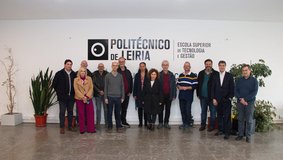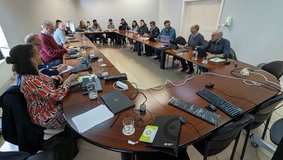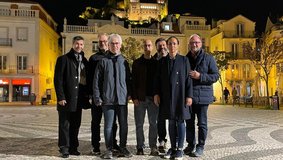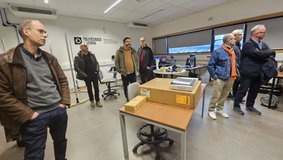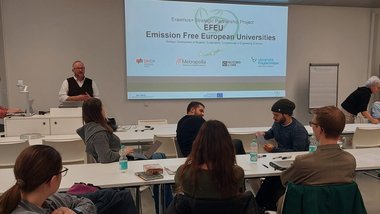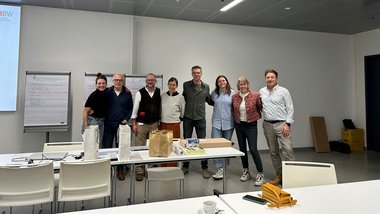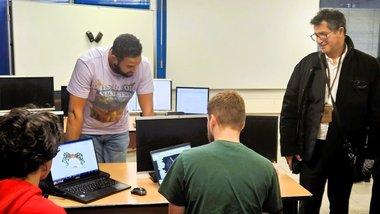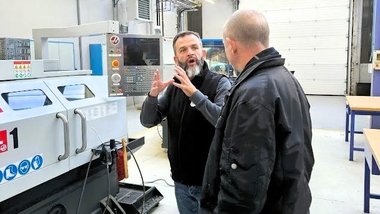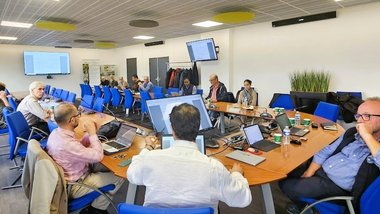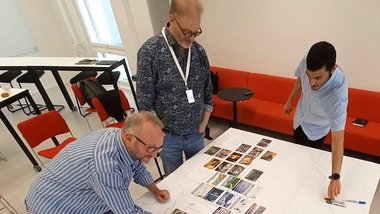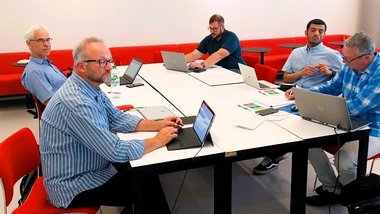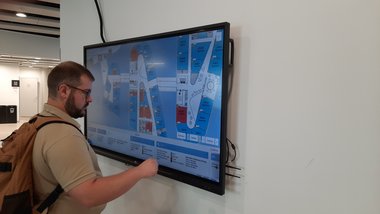EFEU - News
Medieval castles and sustainable universities
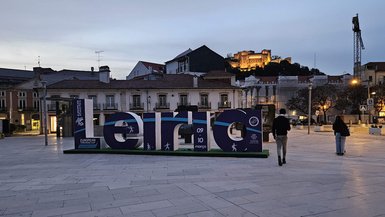
3rd transnational project meeting (TPM) – Leiria, Portugal
The Leiria Castle stands majestically atop a hill, offering a picturesque view of Leiria. Situated between Porto and Lisbon, Leiria is renowned for its charm and medieval ambience. It was chosen as the venue for the 3rd Transnational Project Meeting. This two-day event unfolded at the campus of Politécnico de Leiria (IPL).
OBJECTIVES OF THE MEETING
The objectives outlined for this meeting were similar to the previously held TPM and therefore included:
- Addressing pertinent matters related to project management.
- Facilitating interactive co-creation workshops on topics relevant to the project’s work packages.
- Determining optimal approaches for executing the outlined activities within the work packages.
- Orchestrating activities aimed at fostering team cohesion and synergy.
- Observing measurable sustainability initiatives implemented by a university campus.
PARTICIPANTS/GUEST SPEAKERS
Participants joined the event through two avenues: in-person attendance and virtual participation via MS Teams. The project welcomed the following attendees:
- DHBW: Klaus Homann, Christian Götz, Abeo Trotter
- IPL: Luis Coelho, Rui Ruben, Judite Vieira, Paulo Carvalho, Marcelo Gaspar
- Metropolia: Jorma Säteri
- UPHF: El Hadj Dogheche, Dominique Deneux, Hachimi Abba, Abdelmalik Taleb-Ahmed
Several distinguished guest speakers enriched the event with their expertise and insights. They represented various institutions and industries:
- Yuqiang Gu - DHBW Stuttgart
- Ana Pires - CENTIMFE
- Joana Frazão - Fravizel
- Carlos Viegas - Leerdam Crisal Glass
- Isabel Lança - Ordem dos Engenheiros
Highlights
The event commenced with welcoming remarks delivered by esteemed figures: Rui Ruben, the Project Leader of the IPL Team; Maria Leopoldina Alves, Department Coordinator of the Mechanical Department at IPL; and Pedro Assunção, Vice-President of IPL.
Subsequently, presentations and discussions were held, which revolved around ongoing activities encompassing the five work packages within the EFEU project.
Discussions centred on crucial aspects of project management, including the Beneficiary Model, Project Tracker 2.0, Budget Management, Dissemination Activities, and Project Impact and Indicators.
The DHBW Team presented an overview of the findings from the EFEU Sustainability Awareness and Mobility Survey, which prompted discussions on the survey's objectives. These were outlined as providing support for sustainability efforts at each partner university and developing a collective sustainability awareness index. Subsequently, two working groups were formed to aid in the analysis of the survey results.
A revised version of the EFEU CFC Report will be presented at a later date. The targeted completion date is 31/03/2024, aligning with the intention to present the results at the UIIN conference.
The UPHF Team presented an updated iteration of the EFEU Curriculum Analysis Tool, with suggestions made by the other team members to optimise the format and outcomes.
The IPL Team presented the methodology and findings of their campus's curriculum analysis, offering insights gleaned from the exercise. Additionally, they proposed potential adjustments aimed at enhancing the results.
The UPHF Team introduced a revised version of the proposed BIP. Recommendations were provided to enhance its implementation, including adopting a project-based methodology, modifying the time frame and establishing the number of allocated ECTS.
Yuqiang Gu from DHBW Stuttgart delivered an online presentation regarding the ongoing project “Databrix” (www.databrix.org). Databrix is a collaborative e-learning platform addressing data science and machine learning projects. The highlighted project involves visualising CO2 concentrations in the world's oceans and was proposed as a possible project that could be transferred to the project partners.
The IPL team outlined the initial steps for Work Package 4, which included preparing the mobility survey results and creating a web platform to showcase the carbon footprint of learning activities among partners.
Furthermore, team members highlighted the importance of leveraging results from Work Package 4 to transform the community's commuting behaviours. This includes developing a process, pilot program, or roadmap to decrease the carbon footprint of campuses, faculties, and the community. Moreover, workshops should be considered to expand sustainable mobility practices to other campuses.
- Ana Pires, a representative from CENTIMFE, presented on "Research & Technology Organisations (RTOs) as Catalysts for Carbon Neutrality and Social Responsibility.” The highlight of the presentation was the ensuing discussion, which addressed approaches to diagnosing educational needs, supporting digital transition, and developing and strengthening sustainability skills. Additionally, the company advertised a self-diagnostic tool that students of partner universities can use to assess their sustainability proficiency levels.
- Joana Frazão, the Human Resource Manager from Fravizel, delivered a presentation titled "Fravizel: Sustainability Proposal." During the presentation, the Fravizel representative delved into the essential skills anticipated by employees, the incorporation of serious games to bolster sustainable education, and the sustainable evolution of the quarry industry.
- Carlos Viegas, Leerdam Crisal Glass, presented the following: " Decarbonization of the Glass Industry: A challenge that cuts across different areas of Engineering.” The executive discussed the decarbonisation process within the glass industry, the relevance of critical partnerships in addressing complexities, and the significant competencies and attributes of engineers employed in the glass industry.
- Isabel Lança from Ordem dos Engenheiros presented the following topic: “Engineering and Sustainability.’’The environmental engineer laboured on the following theme: the critical role of engineering in sustainable development. She discussed the role of skills and partnerships in ensuring engineers are adapted to the goals and priorities set out by the SDGs and future employment demands.
SHARING OF BEST PRACTICES: SUSTAINABLE CAMPUS
A tour was done of the Center for Rapid and Sustainable Product Development (CDRSP) to demonstrate:
- the contributions and involvement of students in innovative and sustainable projects and
- sustainability initiatives focused on recycling and upcycling of various source materials.
THE WAY FORWARD
The project partners confirmed the date of the forthcoming project meeting.
Action items were delineated for project members to bolster the advancement of planned project activities.
We heartily appreciate the IPL team for their outstanding efforts in hosting the EFEU team and ensuring the success of the third transnational project meeting.
EFEU and Tuesday of Researchers
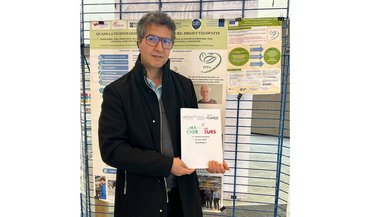
On March 26th, 2024, Prof. Dr. El Hadj Dogheche from the EFEU Team at UPHF (Université Polytechnique Hauts-de-France) participated in the twelfth edition of Mardi des Chercheurs (MDC) – Tuesday of Researchers – held in Mons, Belgium. This event, initiated by the Polytechnic Faculty of Mons in the early 2000s, serves as a platform created by researchers for researchers. Its objectives include introducing colleagues from diverse faculties to ongoing research within the university, fostering interdisciplinary collaboration among researchers, and informing Master’s students about available funding opportunities.
During the event, Prof. Dr. Dogheche showcased the EFEU project alongside the UPHF students' initiative. The interim results of the EFEU project, such as the development of the EFEU carbon footprint calculator and the EFEU Sustainability Awareness and Mobility Survey, as well as the outcomes of the EFEU Curriculum Analysis, were presented to the attendees. The participants were also introduced to the student’s project entitled Vélopattes as Foot-cycle, which highlighted an inclusive and sustainable approach to design, fabrication, and prototyping. Prof. Dr. Dogheche had the opportunity to address an audience of over 250 participants, including research assistants, doctoral students, and professionals in various scientific fields.
Attendees found the details of the EFEU project and the Vélopattes as Foot-cycle stimulating and expressed a keen interest in learning about the future development of both projects.
EFEU meets EuroFM Deep COIL 2023 @DHBW Stuttgart
On December 15th, 2023, EFEU met EuroFM´s Deep COIL 2023 during the “Live Final” at DHBW-Stuttgart. The EuroFM Deep COIL 2023 was dedicated to EU´s ESG regulations and the question, of how Facility Management can support the successful sustainable transformation of organizations.
Klaus Homann presented the EFEU project to 34 students and 9 academics from Hanzehogeschool Groningen, Zuyd Hogeschool, Hogeschool Inholland Amsterdam, The Hague University of Applied Sciences and ZHAW Zurich University of Applied Sciences.
Both projects share strong common interests and agreed that the opportunities for future cooperation should be explored.
‘Athens of the North’ and Emission-Free Universities
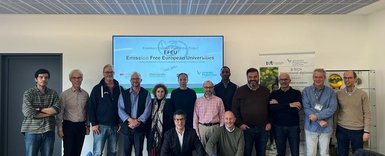
2nd Transnational Project Meeting (TPM) – Valenciennes, France
Valenciennes, sometimes referred to as the ‘Athens of the North’, was the location of the 2nd Transnational Project Meeting. The 2-day meeting took place at the Université Polytechnique Hauts de France Campus at Mont Houy, Valenciennes.
Objectives of the meeting
The objectives outlined for this meeting were:
- addressing matters related to project management,
- facilitating discussions and conducting presentations on topics relating to the project’s work packages,
- determining the best approaches in undertaking the outlined activities of the work packages,
- facilitating team building, and
- observing measurable sustainability actions implemented by a university campus.
Participants/Guest Speakers
Participation was possible both in-person and virtually via MS Teams. The project members in attendance were: Klaus Homann, Christian Götz, Abeo Trotter (DHBW); Luis Coehlo, Rui Ruben, Judite Vieira, Paulo Carvalho, Marcelo Gaspar (IPL); Jorma Säteri, Mehran Attar (Metropolia); and El Hadj Dogheche, Dominique Deneux, Hachimi Abba, Abdelmalik Taleb-Ahmed (UPHF)
There were notable guest speakers such as Guillaume Dumont and Olivier Senechal from Institut National des Sciences Appliquées de Hauts-de-France (INSA HdF), Loic Lezzani from the Mechanical Department of the Institut Universitaire de Technologie (IUT), Jean Luc Franquelin from the Renault Group and Bertrand Brider from the Unit for Sustainable Development & Social Responsibility at UPHF.
Highlights
Welcoming remarks were made by Isabelle Massa, director of the Institut Universitaire de Technologie - Valenciennes (IUT) and Klaus Homann (DHBW).
Presentations and discussions were held on the work plan, details and on-going activities of the five work packages forming part of the EFEU project.
Work package 1: Project Management
Matters related to communication management, project monitoring, and budget management were discussed and outstanding issues were documented.
Work package 2: State-of-the-Art Analysis: Universities on their way to emission neutrality
Discussions were centred on two activities: the development of the EFEU Carbon Footprint Calculator (CFC) and the Sustainability Awareness/Mobility Survey.
EFEU CFC:
- Mehran Attar (Metropolia) presented the latest version of the EFEU Carbon Footprint Calculator.
- The deadlines were finalised for submitting the preliminary and final reports.
- Each partner gave a summary of their first experiences with data collection.
Sustainability Awareness/Mobility Survey_
- Abeo Trotter (DHBW) presented the latest version of the survey. The survey was improved by addressing and amending the problematic questions.
Work package 3: Curriculum and Module Development: From Teaching and Learning to Emission Neutrality
There were several insightful and inspiring presentations, which are summarised below.
- Dominique Deneux (UPHF) touched on the topic: ‘Curriculum Analysis and Module Development’ by presenting options and resources to be considered for the EFEU Curriculum Analysis Tool and EFEU module.
- Guillaume Dumont (INSA HdF) gave a presentation on the topic: ‘Training an Engineer for the 21st century.’ He spoke on the ClimatSup project. The project, through the involvement of INSA, is focused on the inclusion of climate and energy topics within engineering programs offered at UPHF.
- Hachimi Abba (UPHF-INSA HDF) presented on, ‘Strategy/policy for teaching and learning sustainability competencies for the period: 2022-2026 at the Unit for Sustainable Development & Social Responsibility, IUT-UPHF. ’ He discussed measures taken to raise the sustainability profile of UPHF such as the training of staff and students, raising staff awareness, organising collective actions and the implementation of specific strategies e.g. the Sustainable Development and Social Responsibility (SD&SR) Assessment, Community Vision 2030 and 2022-2026 Sustainable Development Plan.
- Olivier Senechal (INSA HdF) gave a presentation on the ‘Development of Sustainability Competencies in System Analysis, Maintenance, Dependability, Quality, Hygiene & Safety.’ He provided examples of learning activities, e.g. student projects, case studies, and courses, used to enlighten students on the topics of climate change and sustainable development.
- Loic Lezzani (IUT) presented on the following topic: ‘Environmental Design & Environmental Footprint dedicated to the Mechanical Engineering BSc. Program: Empowering Future Decision-Makers.’ He presented the actions taken to familiarise students with environmental challenges, sustainable product design, new standards, comprehensive eco-design approaches, and the use of eco-design management software.
- Jean-Luc Franquelin (Renault Group) addressed the issue of: ‘Industry Decarbonisation: Scope & Targets.’ He detailed the gains and challenges of the decarbonisation process within the automobile industry.
- Bertrand Brider (UPHF) introduced the serious game, My Earth in 180 minutes. The objective of the game is for participants to determine the type of actions necessary to reduce their carbon footprint.
On the second day, partners presented the results of the initial curriculum analysis of engineering programs being offered at their universities. The results confirmed significant variations in the offering of sustainability teachings. However, in the process of conducting these analyses, several best practices were identified such as the use of sustainability strategies, master plans, AI applications and the Open Badge Factory platform.
Work package 4
Rui Ruben (IPL) gave an outline of planned activities for Work package 4. The planned objectives are to further develop communities’ access to public transportation, increase commuting options for students, and evaluate the impact of online teaching on carbon dioxide emissions. The results generated from the EFEU survey and the EFEU CFC will be integral in meeting these objectives.
Work package 5
Klaus Homann (DHBW) discussed the staging of the EFEU Summer School and asked for ideas for the program, structure, and means of integrating partners.
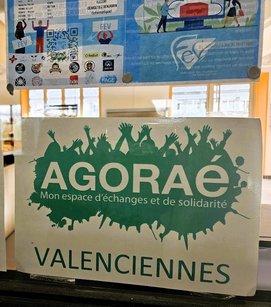
The facility manager gave a tour of the Mont Houy Campus. The intentions were to:
- demonstrate how sustainability initiatives were implemented in the laboratory of the engineering programs,
- demonstrate the contributions and involvement of students in projects that promote sustainability and inclusiveness,
- demonstrate how the campus is attempting to be socially, economically and environmentally responsible, and
- demonstrate the campus efforts in aligning with mandates of SDGs set for HEIs.
The date of the upcoming project meeting was confirmed by the project partners.
Action items were outlined for project members to support the further execution of the project’s planned activities.
A special thanks to the UPHF team for doing an exceptional job at hosting the EFEU team and ensuring the second transnational project meeting was a success.
Rice Cakes and Carbon Neutrality
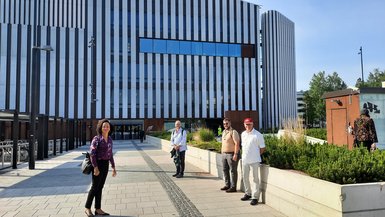
1st Transnational Project Meeting (TPM) – Helsinki, Finland
Finland, known for its delicious Karelian pastries (rice cakes), numerous lakes, saunas, liquorice and midnight sun, was the location of the first transnational project meeting of the Emission Free European Universities (EFEU) Project. The 2-day meeting took place at the Myllypuro Campus of Metropolia University of Applied Sciences in Myllypurontie, Helsinki.
The objectives of the meeting were to:
- address matters related to project management,
- fine-tune the details of the project’s work packages,
- facilitate discussions and conduct presentations on topics forming part of thework packages,
- facilitate team building, and
- determine the best approaches in undertaking the outlined activities of the work packages
Participation was possible both in-person and virtually. Virtual participation was provided to promote inclusivity and greener practices, core principles of the EFEU project. The project members in attendance were: Klaus Homann, Christian Götz, and Abeo Trotter (DHBW); Luis Coehlo, Rui Ruben, and Judite Vieira (IPL); Jorma Säteri, Mehran Attar, and Paula Sajaniemie (Metropolia); as well as El Hadj Dogheche, Dominique Deneux, Hachimi Abba, and Bertrand Bridier (UPHF).
Highlights
Welcome remarks were made by the project leader of the Metropolia University of Applied Sciences, Jorma Säteri, who also perused the planned agenda for the meeting. The discussions and presentations that ensued are documented below.
- Project Management
The team was reminded of their responsibility in time-keeping and documentation management. Draft versions of the Project’s Presentation and LinkedIn Profile were presented, and partners were invited to provide feedback and implement changes as they see fit. - Details of Work Packages
The work packages (WP) were reviewed by the project team. Amendments were suggested and made to the:- Time frame of project’s activities
- Supplementary details for sections relating to the Carbon Footprint Calculator, Transforming Learning Activities, Creation of Modules/Teaching units, and Design of Digital teaching Units
- EFEU Carbon Footprint Calculator (CFC)
- The results of the working groups, focused on the development of CFC for universities in the respective countries of each project partner were reported and documented.
- Current Application of CFCs: A presentation was done by Paula Sajaniemi, a sustainability expert from Metropolia University of Applied Sciences (MUAS), on the methodology used in the carbon footprint calculation for MUAS. Mehran Attar, a master’s student from MUAS, also gave a presentation. The focus of his presentation was the status of currently existing carbon footprint calculators.
- Determining a Common Tool to Calculate the Carbon Footprint of Partner Universities. The following decisions were reached:
- Commuting and procurement data would be included while values related to food and construction were to be excluded.
- The inclusion of other input values would depend on availability.
- The emission coefficient is to be determined later, after the piloting phase.
- The scope of the CFC is to be limited to the campus level and if possible, individual programs.
- Development of Sustainability Awareness Survey
- It was agreed to integrate the sustainability awareness survey and planned mobility studies of project partners.
- Notable examples of sustainability awareness studies were presented.
- Partners were to determine the specific target groups, intended purpose, nature of questions, and type of platform in administering the survey.
One of the planned activities of Work Package 5 is developing the proof of concept for a serious game. The Climate Fresk game, a game that teaches the fundamentals of climate change and its impact, was introduced and explained to the team on-site.
Within the context of the project, participation in the game was very helpful as it provided the experience of administering a serious game, demonstrated its potential as a great teaching tool for partner universities, and proved to be a significant teambuilding exercise
Jorma Sateri provided the team with both a virtual and physical tour of the Metropolia Campus. The objective was to demonstrate the campus‘ efforts in incorporating the sustainable development goals (SDGs). It provided behind-the-scenes access and information on the intricacies of the latest technologies applied in facility management. An explanation was provided on how these technologies contribute to the building’s improved environmental performance and user experience.
The initial results of CFC are to be presented at the DHBW research day (July 2024).
Specific duties were assigned to project partners to support the timely and systematic implementation of activities forming part of Work Package 2.
The EFEU team was satisfied with the results achieved during the first TPM and looks forward to the next phases in the implementation of the project.
A special thanks to the Metropolia team for doing a great job at hosting the EFEU team and successfully organising the first transnational project meeting.

